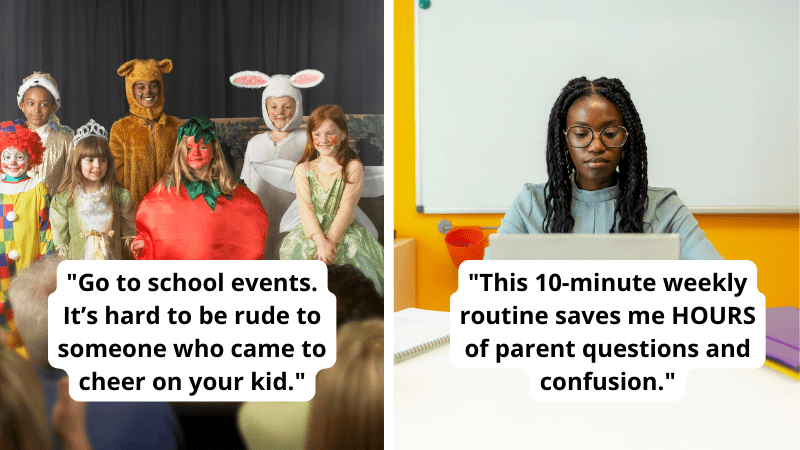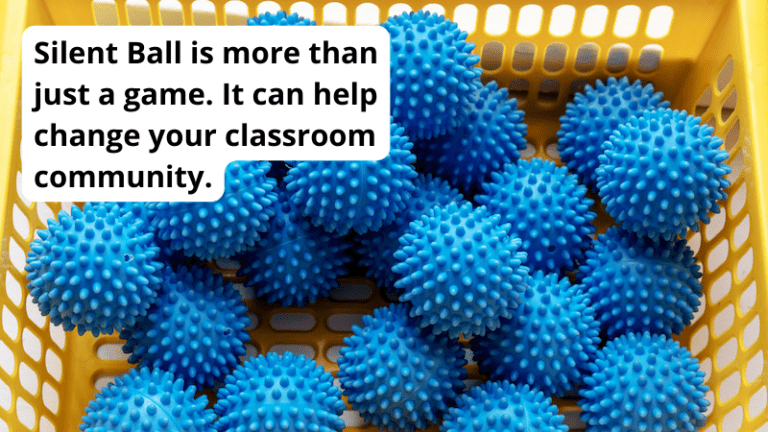As teachers, we’re all familiar with classroom management. But something we rarely talk about as a skill set? Advice for managing parents.
The teacher-parent relationship is a lot like any relationship. There needs to be effort on both sides. They take time to build. There are highs and lows. You can share a salted caramel milkshake while staring into each other’s eyes.
Just kidding. That last one is for romantic relationships only.
While there’s no magic potion for getting parents to fall in love with you, here’s what our audience had to say when it comes to advice for managing parents.
Build a foundation immediately with positive communication.
“Parents want to know what’s happening at school, so frequent communication goes a long way.”
“Sending them pictures of their child having fun and learning will always make them happy.”
—Brittani M.
“I send out an introductory email to parents before school starts, and then I send positive updates when I am able.”
“I worked in customer service for quite a while before becoming a teacher and channel those skills into each email exchange.”
—Ashley E.
“Be sure to share good news as much as bad news.”
“Parents are used to teachers talking to them about negative things about their children, so it’s great to talk to them about the positive things too.”
—Rosie T.
“Positive emails are a must!”
“I find that the parents are easier to deal with later on if I have to send a bad report. I make it a point to send out as many positive emails as possible early in the year! The kids appreciate the accolades too and tend to be a bit more respectful.”
—Jamie L.
Create transparency with regular updates.
“I send a weekly email to my parents with curriculum updates, test/quiz reminders, and a ‘Are You Smarter Than an 8th Grader’ dinnertime question for my content.”
“It was a bit of a slog to get off the ground, but now this routine that takes me under 10 minutes saves me HOURS of ‘I didn’t know about this’ or hostility from parents feeling in the dark.”
—Annie V.
“A colleague of mine told me she sends out a Friday newsletter.”
“I tried it before COVID and it went amazingly well. I need to return to doing that.”
—Kelly P.
“After making sure I had permission for this on every level imaginable, I made a class Instagram account.”
“Since it’s a public account, I don’t show student faces, but I use it to highlight parts of our week for students and parents—even some administrators and district personnel follow it. It’s fun to look through and see one student’s stop-motion animation project and hear another student’s amazing poem (read off-camera). Instagram gets a bad rap for promoting unrealistic ‘highlight reels’ of our lives, but in this case it definitely serves me!”
—Jacey M.
Set boundaries (and use them!).
“Definitely honoring the hours of the work day.”
“Email and phone calls never on weekends. I tell myself this … ‘schedule send’ is my friend.”
—Michael K.
“Find out what your district’s timeline is on responding to parents—it’s usually 24 hours, but in some cases it’s 48—and do not respond to any hostile emails from parents until you’re an hour or so from that deadline.”
“In the same way we don’t reward students for behaving rudely, don’t reward rude parents with immediate communication. Plus, you’ll have as much time as you need to respond calmly and unemotionally.”
—Bill W.
Invest in relationships.
“Show your investment in students and families by going to games, school musicals, or choir and band concerts when you can.”
“It’s hard to be rude and demanding to someone who came to cheer on your kid.”
—Randy S.
“Always start out by reminding parents/guardians that we’re all on the same side with the same goal: success for the student.”
—Barbara B.
“Besides being positive and proactive, it’s important to realize much of parent concerns are coming from their hopes and fears for their child.”
“I find it beneficial to remember that what is coming across as anger about a grade is rooted in a fear of failure or it goes against the hope of college (even when it’s just 1st grade).”
—Dani O.
Out of all the advice for managing parents, a common sentiment was brought up again and again: Be proactive so you don’t have to be reactive.
Now if you’ll excuse me, I need to get proactive about getting a salted caramel milkshake.
What’s your best nugget of advice for managing parents? Let us know in the comments!
Looking for more articles like this? Subscribe to our newsletters.


